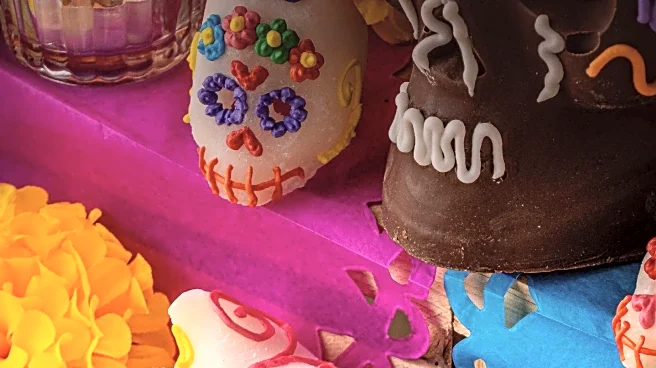What's Happening?
In the United States, the tradition of honoring pets during the Day of the Dead is gaining popularity. This Mexican holiday, traditionally dedicated to remembering deceased family members and friends, now includes pets as part of the celebrations. People
are creating ofrendas, or altars, for their pets, featuring photos, toys, and treats. The practice is rooted in Aztec beliefs that dogs were sacred and could guide spirits in the afterlife. Mathew Sandoval, an author on the subject, notes that more people are creating pet-specific ofrendas, reflecting the deep companionship pets provide. These altars often include marigolds, candles, and bowls of water to guide and refresh spirits. The tradition is seen as a way to grieve and remember pets as beloved family members.
Why It's Important?
The inclusion of pets in Day of the Dead celebrations highlights the evolving nature of cultural traditions and the significant role pets play in people's lives. This trend reflects a broader societal recognition of pets as integral family members, deserving of remembrance and honor. It also underscores the blending of cultural practices, as more Americans adopt and adapt traditions from diverse backgrounds. The practice provides a meaningful way for pet owners to process grief and celebrate the joy their pets brought into their lives, fostering a sense of community and shared experience among those who participate.
What's Next?
As the tradition of honoring pets during Day of the Dead continues to grow, it may lead to more widespread acceptance and integration of pet memorials in other cultural practices. Community events, such as those organized by zoos and animal shelters, could become more common, providing spaces for collective remembrance. This trend might also inspire new products and services catering to pet memorials, reflecting the increasing demand for ways to honor pets. Additionally, educational efforts about the cultural significance of Day of the Dead could expand, promoting understanding and appreciation of its origins and practices.
Beyond the Headlines
The practice of creating ofrendas for pets raises questions about the commercialization of cultural traditions and the potential for cultural appropriation. As more people outside the traditional observance adopt these practices, it is important to approach them with respect and understanding of their cultural significance. This trend also highlights the emotional bonds between humans and animals, prompting discussions about the ethical treatment of pets and their role in society. Long-term, this could influence how pet loss is addressed in mental health and support services.

















